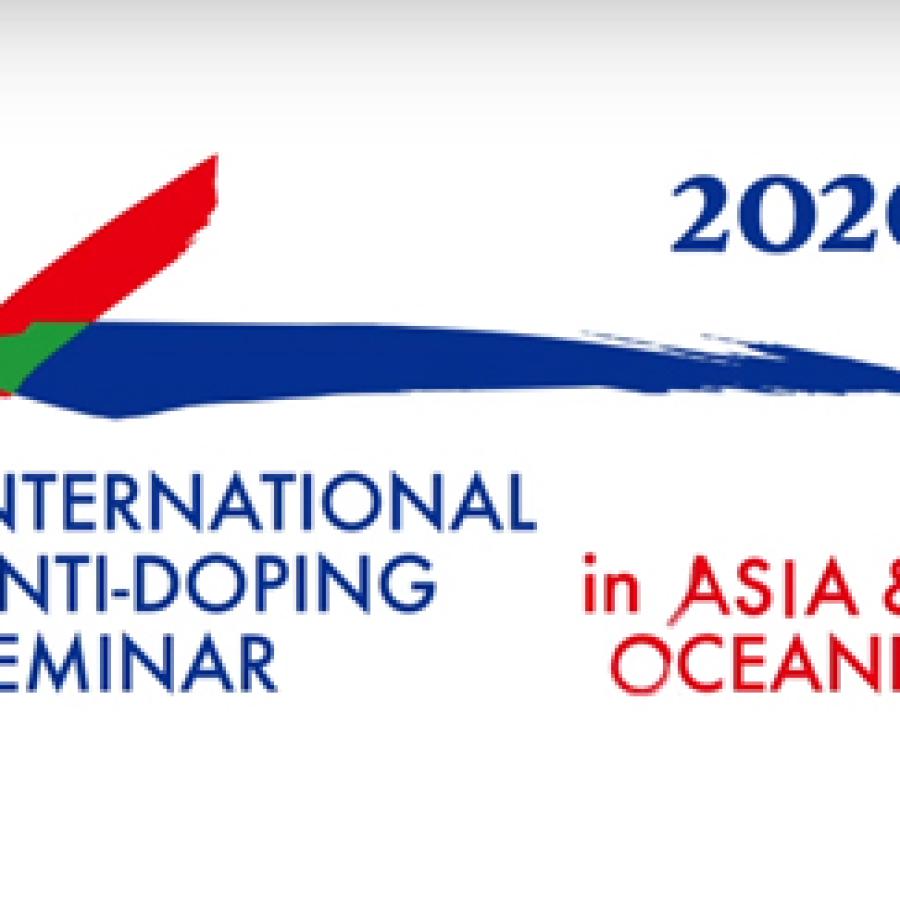Releases
WADA partners with Japan Anti-Doping Agency for International Anti-Doping Seminar in Asia-Oceania

The World Anti-Doping Agency (WADA) played an important role during the 2020 edition of the annual International Anti-Doping Seminar for Asia and Oceania, organized by the Japan Anti-Doping Agency (JADA) in partnership with WADA from 1-3 December.
Day one of the Seminar opened with participants being welcomed by Tanose Taido, State Minister of Education, Culture, Sports, Science and Technology (and WADA Executive Committee and Foundation Board member), followed by a keynote address by WADA’s President, Witold Bańka, and a detailed presentation by Director General, Olivier Niggli, on WADA’s ongoing work overseeing the global anti-doping program.
The virtual event, which was commissioned by the Government of Japan through the Japan Sports Agency (JSA), included almost 240 registered participants and was focused on Anti-Doping Organizations’ (ADOs’) readiness for the introduction of the revised World Anti-Doping Code (Code) and related International Standards (Standards) on 1 January 2021.
In his speech, which he gave from Warsaw, Poland, Mr. Bańka touched on a number of important issues facing the anti-doping community, including the introduction of the Code and Standards, securing additional funding for Clean Sport, the importance of athlete engagement and education, and maintaining strong partnerships with all stakeholders. He was quick to point to the fact that the eyes of sports-lovers all over the globe were currently focused on Asia, with Japan having hosted a successful Rugby World Cup in 2019 and with more high-class sporting action on the horizon for the region.
Mr. Bańka told the meeting: “There is so much going on in this region right now. Whether it is the 2022 Beijing winter Olympic and Paralympic Games, the 2022 FIFA World Cup in Qatar, or next year’s summer Olympic and Paralympic Games in Tokyo, it is fair to say that Asia is the center of the sporting world at the moment.
“2021 will see many of us working together to ensure that the Tokyo 2020 Olympic and Paralympic Games are truly Games to remember and cherish. We owe it to sport to provide the world’s best athletes with the opportunity to gather on a level playing field and to entertain and amaze us with their athletic prowess and sense of fair play.
“Just like in sport, there will be challenges along the way. We will from time to time be stretched in our resources and our resilience, but I am full of optimism that we will succeed in further strengthening the global anti-doping system together.”
Delivering his presentation from WADA’s headquarters in Montreal, Canada, Mr. Niggli explained the impact that the COVID-19 pandemic was having on anti-doping worldwide and how the global community was working together to maintain the integrity of the system. He touched on a number of important developments for WADA so far in 2020, including the strengthening of the Agency’s independent Intelligence and Investigations Department, supporting ADOs in their implementation of the revised Code, and significant progress made in the areas of education, the Anti-Doping Administration Management System, known as ADAMS, and reform of WADA’s governance model as the Agency leads anti-doping into a new era.
Mr. Niggli said: “The anti-doping landscape has changed significantly and WADA is evolving with it. As a consequence, the Agency is now much better equipped to deal with the considerable challenges we face. That progress is set to continue with further governance reforms, our Five-Year Strategic Plan 2020-24 and the 2021 Code and Standards.
“We are committed to engaging and empowering athletes in developing clean sport; to building anti-doping capacity and community worldwide; and to securing the additional funding that is required to further enable doping-free sport. While we cannot do this alone, we are confident that with the support of all our partners, we will succeed.”
In addition to the contributions from Mr. Bańka and Mr. Niggli, the first day also saw the WADA Director of Legal Affairs, Julien Sieveking, and lead drafter of the Code, Richard Young, deliver a presentation to outline the main changes contained within the latest Code revision and what ADOs need to do to be prepared.
Day two of the seminar featured WADA Vice-President Yang Yang and Chair of the WADA Athlete Committee, Ben Sandford, join Dr Koji Murofushi, Commissioner of the JSA, on a panel to discuss the Athletes’ Anti-Doping Rights Act, which was approved by the Agency’s Executive Committee on 6 November 2019 during the World Conference on Doping in Sport in Katowice, Poland.
In addition, WADA Director of Education, Amanda Hudson, updated the seminar on the new International Standard for Education, which comes into force on 1 January 2021, with the goal of ensuring that all athletes’ first interaction with anti-doping system is in the form of values-based education rather than testing.
On day three, WADA Director of Standards and Harmonization, Tim Ricketts, presented on the important issue of compliance with the Code from 2021 onwards, under the theme ‘Let’s be ready to raise the bar’. WADA Chief Operating Officer, Frédéric Donzé then wrapped up the meeting highlighting some of the key points and take-away items for those present.

